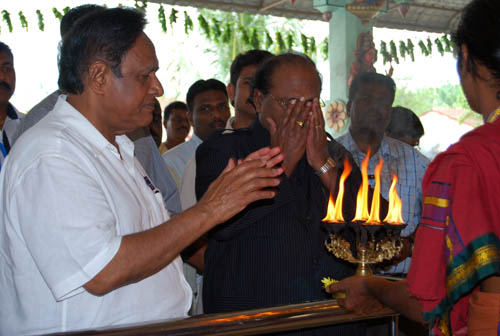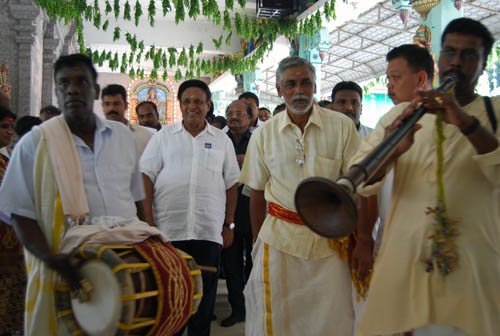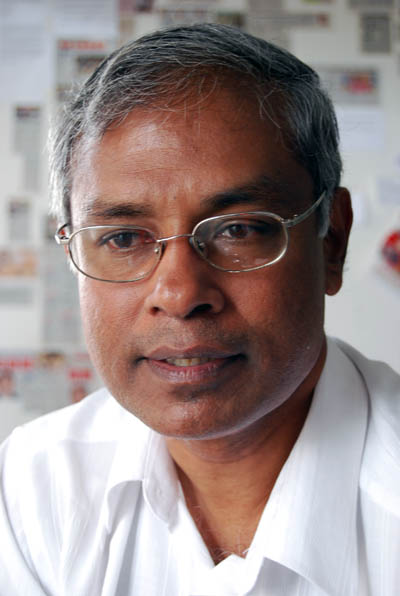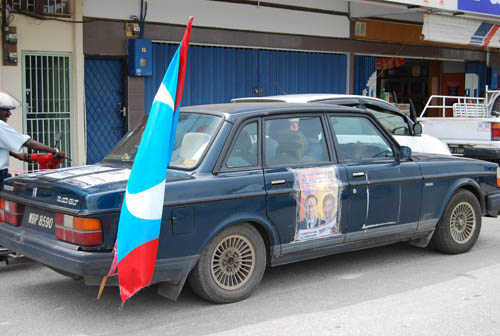
By Cindy Tham
cindytham@malaysiavotes.com
SUNGAI SIPUT: The Sri Mariamman Temple in Taman Dovenby here was a hive of activity on March 5, as devotees carrying the kavadi made the journey on foot from several kilometres outside the Dovenby Plantation to the temple located within its grounds.
The musicians filled the jasmine and incense scented air with loud rhythmic music as the devotees and their entourage walked and danced their way to the temple. They bore the kavadi, which literally means burden or sacrifice at every step, in supplication for divine blessings.
The temple committee members stood at the temple gates as the devotees marched through. But there was another reason they were at the gates that fateful afternoon: they were awaiting the arrival of MIC president and Sungai Siput parliamentary seat incumbent Datuk Seri S. Samy Vellu.
When he arrived in a convoy of big cars, the local folk inched their way to shake his hand or greet him. Samy Vellu was led inside the temple for a prayer ceremony before he and the temple committee settled down for lunch under the tent outside.
Since nomination on Feb 24, Samy Vellu, who is seeking re-election for the ninth term, has been keeping a busy campaign schedule, shuttling between Kuala Lumpur and Sungai Siput, Perak. After the visit to the temple, he was scheduled to meet the Malay community in Kledang Utama and later at night, attend a stage show in front of his operations centre in town.
Moment of truth
These days, there is no guarantee that he will always receive the kind of warm reception he did in Taman Dovenby. Following the November, 2007 street protests led by the Hindu Rights Action Force (Hindraf) – over the demolition of temples to make way for development, and the Indian community’s plight – and the subsequent detention of five of its leaders under the Internal Security Act for allegedly having terrorist links, the MIC has drawn flak from some quarters who say it has not done enough to protect the community’s interests.
 The main target of such criticisms is Samy Vellu, 71, who has been MIC president for 29 years. In his visits to some places throughout the country in recent weeks, he has been jeered or confronted by the crowd, who demand the release of the Hindraf detainees or that he look into their concerns.
The main target of such criticisms is Samy Vellu, 71, who has been MIC president for 29 years. In his visits to some places throughout the country in recent weeks, he has been jeered or confronted by the crowd, who demand the release of the Hindraf detainees or that he look into their concerns.
Much has been said about Samy Vellu being the last of his generation who is still in government. His peers such as Tun Dr Mahathir Mohamad, Tun Dr Ling Liong Sik and Datuk Seri Dr Lim Keng Yaik have all stepped down to make way for the next generation of leaders. Samy Vellu has always maintained that he would stay as long as his services were needed.
This 2008 general election will be the barometer of whether the people still want him around. The moment of truth will be when the results emerge on the evening of polling day on March 8, which happens to be Samy Vellu’s birthday.
To his credit, most people in Sungai Siput say he has visited the constituency regularly over the years and not just during election season.
Sungai Siput
The local concerns here are the typical problems faced by a small town: farmers crying for land titles to ensure they are not forced to make way for private development, fair compensation if they are displaced, better infrastructure and rising cost of living.
There are 47,424 voters in this parliamentary constituency, 40.3% of whom are Chinese, 36.5% Malay, 22.6% Indian and 0.6% Others. Sungai Siput has two state seats, Jalong and Lintang.
 Competing against Samy Vellu for the third straight election is Dr. Michael Jeyakumar Devaraj, who is the pro tem central committee member of Parti Sosialis Malaysia, which is still in the midst of seeking registration. For this election, he is running under the Parti Keadilan Rakyat (PKR) banner.
Competing against Samy Vellu for the third straight election is Dr. Michael Jeyakumar Devaraj, who is the pro tem central committee member of Parti Sosialis Malaysia, which is still in the midst of seeking registration. For this election, he is running under the Parti Keadilan Rakyat (PKR) banner.
There is also an independent candidate, Nor Rizan Oon, whom many local folk have not seen since nomination day.
When Jeyakumar first entered the fray in 1999, he lost to Samy Vellu but managed to reduce the majority to 5,259 votes. However, Samy Vellu bounced back with a 10,235-vote majority in 2004.
Samy Vellu clearly does not see Jeyakumar as his competition. “He can contest 25 times or spend his entire life vying for the seat, I don’t care. I’m not afraid to face him or (Datuk Seri) Anwar Ibrahim himself. I can defeat them,” he was quoted as saying in a Bernama report.
Political analysts think Samy Vellu, backed by a huge BN machinery, will win again. The question is by how big a margin? There is also concern about the sentiment among the Indians, not just in Sungai Siput, but nationwide, which could affect other BN candidates.
On March 7, a day before polling day, the MIC put out full-page statements in the newspapers entitled “An Appeal to All Malaysian Indians”. The statement urged the Indians to vote wisely and not put the community’s future at stake by voting for the opposition. “As human beings, we have our weaknesses… but that can be overcome if we admit the shortcomings and take steps to correct them,” it said. “Just think of what will happen if the MIC candidates are not elected. To the Indian voters, I want to say this: The future of the community is in your hands. Therefore, give your undivided support to MIC candidates in this election.”
The New Straits Times reported that on March 6, BN chairman and caretaker prime minister Datuk Seri Abdullah Ahmad Badawi had put out advertisements in all the Tamil dailies pledging to protect and respect the Indian community’s places of worship. He also pledged to improve education facilities, services for the poor and business opportunities for the community.
In the past week, Samy Vellu has also been interviewed by the press where he listed what the government has done to help the community. He said the government allocated RM430 million between 2001 and 2010, which included building the MIC-run Asian Institute of Medicine, Science and Technology in Kedah, and funding for Tamil schools. He said the government also allocated RM1 million to build temples.
Slow and steady
Jeyakumar, 53, does not have such a long list of allocations to present, but he isn’t the one being accused of failing the community he is supposed to represent. Since 1999, he has maintained his service centre in Sungai Siput, working with the local communities to solve their problems, such as land titles, compensation for being displaced and complications with birth certificate and identity card registration.

With little sources of funding, Jeyakumar’s campaign machinery is like a jalopy next to the BN’s big expensive car. He personally helps to load campaign material into his beat-up 1988 Volvo, which he drives around with the PKR flag stuck into a gap between the bumper and the dented trunk.
According to his asset declaration, the Volvo is worth RM5,000. His other assets include a semi-detached house in Ipoh (RM120,000), a 1986 Mazda (RM3,000), a 1993 Pajero (RM10,000), savings (RM25,000) and shares (RM15,000).
While the MIC and BN were splurging on full-page advertisements in the newspapers and billboards in the past two weeks, in addition to the house visits and ceramahs, Jeyakumar stuck to distributing flyers, visiting houses, holding ceramahs and giving out CDs about the issues at hand and how he will tackle them.
On March 5, he signed a pledge with nine people from various backgrounds, from farmers to factory workers, to raise the rakyat’s concerns in Parliament, object any bill that does not benefit them, set up a Sungai Siput People’s Council for the people to voice their views and continue to attend to the people’s problems through his service centre.
Later that afternoon, when asked about his chances this time around, he told MalaysiaVotes.com, “I think I can get 50% of the support, or higher, from each community.” He said it would be a keen fight between him and the incumbent.
Some of the Indians in Sungai Siput, like those who greeted Samy Vellu at the Sri Mariamman Temple, did not appear to have a problem with the MIC leader at all. But there were voices of discontent elsewhere. A 27-year-old store assistant in Taman Orkid said he came from a family that had voted for the BN for generations. This will be his second time voting. This time, he said, he would vote for the opposition. “I’m actually a Christian but I don’t agree with temples or any place of worship being demolished,” he said.
The Chinese community was harder to read. Most of the people approached for comments were inscrutable, politely saying they did not pay much attention to politics. A couple of them echoed the feedback gleaned from some in the Malay community, which was they did not think Samy Vellu represented their respective community’s interests. However, they noted that he was from the BN, which has been building good roads and infrastructure in Sungai Siput.